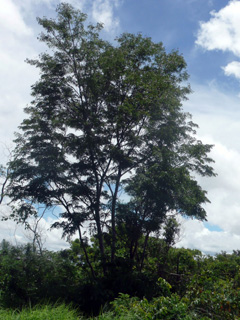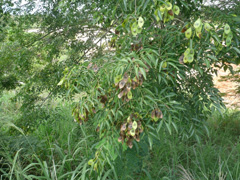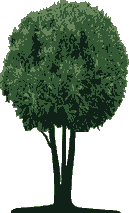 |
|
https://edibleplants.org/ |
 |
| https://edibleplants.org/ |
Translate this page:
Summary
Dalbergia greveana or commonly known as Madagascar Rosewood is a slow-growing tree endemic to Madagascar. It is deciduous and grows up to 15 m tall with crooked, short bole of up to 50cm in diameter. It is overexploited from the wild for timber exportation. A paste is made from rubbing branches on stones with water. It is used as a medicine for various conditions and applied to the face. The wood is heavy and very hard. It works well with hand and machine tools. It is used for cabinet making, furniture, parquet flooring, musical instruments, poles, handles, ladders, fuel, etc.
Physical Characteristics

 Dalbergia greveana is a deciduous Tree growing to 15 m (49ft) by 12 m (39ft) at a slow rate.
Dalbergia greveana is a deciduous Tree growing to 15 m (49ft) by 12 m (39ft) at a slow rate.
See above for USDA hardiness. It is hardy to UK zone 10. The flowers are pollinated by Insects.
It can fix Nitrogen.
Suitable for: light (sandy), medium (loamy) and heavy (clay) soils and prefers well-drained soil. Suitable pH: mildly acid, neutral and basic (mildly alkaline) soils and can grow in very acid soils.
It cannot grow in the shade. It prefers dry or moist soil.
UK Hardiness Map
US Hardiness Map
Synonyms
Dalbergia ambongoensis Baill. Dalbergia eurybothrya Drake Dalbergia ikopensis Jum. Dalbergia isaloen
Plant Habitats
Edible Uses
References More on Edible Uses
Medicinal Uses
Plants For A Future can not take any responsibility for any adverse effects from the use of plants. Always seek advice from a professional before using a plant medicinally.
Antibacterial Miscellany
Pieces of branches are rubbed on stones with water to produce a paste which is applied to the face as a medicine against various ailments[ 299 ]. Dichloromethane and methanolic extracts of Dalbergia greveana bark showed activity against gram-positive bacteria[ 299 ].
References More on Medicinal Uses
The Bookshop: Edible Plant Books
Our Latest books on Perennial Plants For Food Forests and Permaculture Gardens in paperback or digital formats.

Edible Tropical Plants
Food Forest Plants for Hotter Conditions: 250+ Plants For Tropical Food Forests & Permaculture Gardens.
More

Edible Temperate Plants
Plants for Your Food Forest: 500 Plants for Temperate Food Forests & Permaculture Gardens.
More

More Books
PFAF have eight books available in paperback and digital formats. Browse the shop for more information.
Shop Now
Other Uses
Fuel Furniture Miscellany Wood
Other Uses: The heartwood is purplish brown, often with darker stripes; it is distinctly demarcated from the lighter coloured sapwood. The grain is generally straight, texture fine to moderately fine and even. The wood is heavy; very hard; once dry, it is very stable in service; it is durable, being resistant to termite and Lyctus attacks, but only moderately resistant to marine borers. It works well, both with hand tools and machine tools, but it blunts sawteeth rapidly; for nailing and screwing pre-boring is needed; painting and varnishing give moderate results because of the oily surface of the wood; gluing properties are moderate; it is suitable for sliced veneer. A very high quality rosewood, it is much in demand for cabinet making, furniture, marquetry and parquet flooring. It is one of the favoured woods for musical instruments, not only because of its beautiful colour and venation, but also because of its clearness of tone. It is also suitable for interior trim, joinery, ship and boat building, vehicle bodies, poles and piles, precision equipment, carvings, toys and novelties, sporting goods, handles, ladders, turnery, pattern making, veneer and plywood[ 299 ]. The wood is used for fuel[ 299 ].
Special Uses
Nitrogen Fixer
References More on Other Uses
Cultivation details
The tree is believed to grow slowly[ 299 ]. Natural regeneration of this species appears to be poor in comparison to other Dalbergia spp that come from western Madagascar, although in Morondava region the trees were found to be prolific seed bearers with abundant natural regeneration[ 299 ].
References Carbon Farming Information and Carbon Sequestration Information
Temperature Converter
Type a value in the Celsius field to convert the value to Fahrenheit:
Fahrenheit:
The PFAF Bookshop
Plants For A Future have a number of books available in paperback and digital form. Book titles include Edible Plants, Edible Perennials, Edible Trees,Edible Shrubs, Woodland Gardening, and Temperate Food Forest Plants. Our new book is Food Forest Plants For Hotter Conditions (Tropical and Sub-Tropical).
Shop Now
Plant Propagation
Like many species within the family Fabaceae, once they have been dried for storage the seeds of this species may benefit from scarification before sowing in order to speed up germination. This can usually be done by pouring a small amount of nearly boiling water on the seeds (being careful not to cook them!) and then soaking them for 12 - 24 hours in warm water. By this time they should have imbibed moisture and swollen - if they have not, then carefully make a nick in the seedcoat (being careful not to damage the embryo) and soak for a further 12 hours before sowing[ K ].
Other Names
If available other names are mentioned here
Native Range
AFRICA: Madagascar
Weed Potential
Right plant wrong place. We are currently updating this section.
Please note that a plant may be invasive in one area but may not in your area so it's worth checking.
Conservation Status
IUCN Red List of Threatened Plants Status : Status: Lower Risk/near threatened

| Related Plants
|
| Latin Name | Common Name | Habit | Height | Hardiness | Growth | Soil | Shade | Moisture | Edible | Medicinal | Other |
| Dalbergia baronii | Palissandre rouge des marais, hitsika, sovodrano | Tree | 20.0 |
10-12
| M | LM | N | Mwe | 0 | 0 | 4 |
| Dalbergia cochinchinensis | Siam Rosewood, Thailand Rosewood | Tree | 25.0 |
10-12
| S | LMH | N | M | 0 | 0 | 4 |
| Dalbergia hupeana | | Tree | 15.0 |
-
| | LMH | SN | M | 1 | 1 | 3 |
| Dalbergia latifolia | Black Rosewood, East Indian Rosewood, Kala sheeshan, Satisal | Tree | 30.0 |
10-12
| M | LMH | N | M | 0 | 2 | 4 |
| Dalbergia louvelii | Andramena, Volombodipona, Violet rosewood | Tree | 15.0 |
10-12
| M | LMH | N | M | 0 | 2 | 4 |
| Dalbergia melanoxylon | African Blackwood, Grenadilla, Mpingo | Tree | 6.0 |
10-12
| S | LMH | N | DM | 0 | 2 | 5 |
| Dalbergia monticola | Hazovola, tsiandalana, voamboana | Tree | 12.0 |
10-12
| S | LMH | N | M | 0 | 0 | 4 |
| Dalbergia nigra | Brazilian Rosewood | Tree | 20.0 |
10-12
| M | LMH | N | DM | 0 | 0 | 4 |
| Dalbergia oliveri | Redwood | Tree | 23.0 |
10-12
| S | LMH | SN | M | 0 | 0 | 4 |
| Dalbergia retusa | Cocobolo | Tree | 20.0 |
10-12
| S | LMH | N | M | 0 | 0 | 4 |
| Dalbergia stevensonii | Honduras Rosewood | Tree | 20.0 |
10-12
| S | LMH | N | M | 0 | 0 | 4 |
|
Growth: S = slow M = medium F = fast. Soil: L = light (sandy) M = medium H = heavy (clay). pH: A = acid N = neutral B = basic (alkaline). Shade: F = full shade S = semi-shade N = no shade. Moisture: D = dry M = Moist We = wet Wa = water.
Now available:
Food Forest Plants for Mediterranean Conditions
350+ Perennial Plants For Mediterranean and Drier Food Forests and Permaculture Gardens.
[Paperback and eBook]
This is the third in Plants For A Future's series of plant guides for food forests tailored to
specific climate zones. Following volumes on temperate and tropical ecosystems, this book focuses
on species suited to Mediterranean conditions—regions with hot, dry summers and cool, wet winters,
often facing the added challenge of climate change.
Read More
Expert comment
Author
Baill.
Botanical References
Links / References
For a list of references used on this page please go here
A special thanks to Ken Fern for some of the information used on this page.
Readers comment
| Add a comment |
|
If you have important information about this plant that may help other users please add a comment or link below. Only comments or links that are felt to be directly relevant to a plant will be included. If you think a comment/link or information contained on this page is inaccurate or misleading we would welcome your feedback at [email protected]. If you have questions about a plant please use the Forum on this website as we do not have the resources to answer questions ourselves.
* Please note: the comments by website users are not necessarily those held by PFAF and may give misleading or inaccurate information.
To leave a comment please Register or login here All comments need to be approved so will not appear immediately.
|
Subject : Dalbergia greveana
|
|
|
|